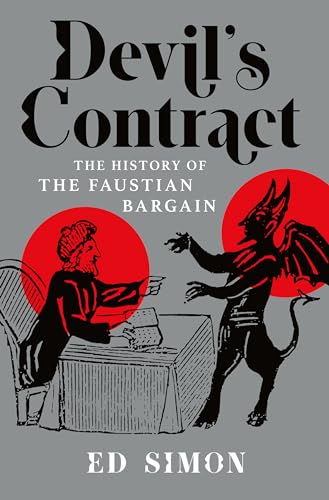What do you think?
Rate this book


336 pages, Hardcover
First published July 9, 2024
Faust’s story begins with Simon Magus, for his is the forerunner of all Faustian bargains, the first to sell his soul to the Devil (or, more paradoxically as the story has it, to sell his soul to God). Whoever wrote the Testimony of Truth was referencing a group known as the Simonians after their founder, a sect accused of any number of impieties and obscenities, of practicing semen- and blood-besmirched orgies as religious rituals, and who called upon supernatural entities to acquire profane powers.This styling isn’t an aberration but self-selected: most sentences are needlessly dense and branch in ways that don’t lead to interesting discoveries but repetitive backtracking. Lord knows I am not the cleanest writer on the planet: that I love the m-dash; that the anti-parenthetical plea from Strunk/White fell on deaf ears with me; that one labyrinthine sentence will suffice when three should probably emerge. So when I say I strongly dislike the way Devil’s Contract is written it is with full, Faustian knowledge of glass houses and thrown stones.
In drawing the strange tale of Theophilus to a close, Hrotsvitha’s words were recorded on vellum of sheep or goat’s skin scraped clean and tanned, stained with ink of charcoal gum and tannic acid, like all Medieval literature written onto the corpses of God’s creatures, the resultant manuscript an intricate mechanism of ligament and tendon, the Word become flesh.This is a nice sentence, in theory. But its impact in reality is not elegant. There is no cohesiveness–no pointed directive–and the signposts that are required to make a grand point in an otherwise complex format don’t exist. In the end, constant musings and flowing, expansive thoughts put down on paper don’t create an atmosphere of trust–I don’t believe that the conclusions we are presented are always where the author intended the text to take the reader. Personally, I know my points get muddled when I don’t re-read and re-write them for clarity, burning off the detritus of my initial flourishes. In the above sentence, for example, I see what I think it wants to be–an object lesson in incantatory phrasing, a written metaphor for thoughts transforming into words, and words into written letters–but I also see what it is: stooped from carrying too many clauses.
Any presumed different between the urbane, sophisticated, and educated Dr. Faust and the women accused of witchcraft has more to do with the vagaries of class and gender than it does with any appreciable difference between the two types of story.This is on page 117, followed by only half a page of text, and then:
That witchcraft isn’t commonly thought of as Faustian may be attributed to the vagaries of class and gender, a separation between the high culture character of the necromancy and the low culture figure of the witch, but both were in communion with the devil.These were certainly the same thought, clearly written at temporally distinct times and then sutured back together without a cohesive edit. I don’t think they should be so close, so similar. I do think that Devil’s Contract has the shape of an intended audiobook, or a podcast (non-derogatory). Perhaps even a personal, self-edited website. Quelle horreur.
Drawing upon stories (scurrilous, apocryphal, and some real) that Alexander VI was in an incestuous relationship with his daughter Lucrezia or that he hosted an orgy with Roman prostitutes within St. Peter’s remembered as the “banquet of chestnuts,” Barnes’s play is prosaic Reformation-era anti-Catholic agitprop, of little interest other than to historians and literary scholars, mostly lacking in the same subtleties that are so engaging in Marlowe’s play. Most crucially, Alexander VI simply sells his soul for power–that old banquet of chestnuts–so that the philosophical considerations that Marlowe makes about creation and imagination, illusion and reality, are totally exorcized.Solid callback on the old chestnut cliché. That’s good stuff. I have no qualms about having read Devil’s Contract, nor even any in recommending it—the subject matter is interesting, and style is simply a matter of taste. You might love how it is constructed. I fully recommend being excited before you pick it up: grudging, cautious obligation toward a text is best reserved for actual legal contracts.